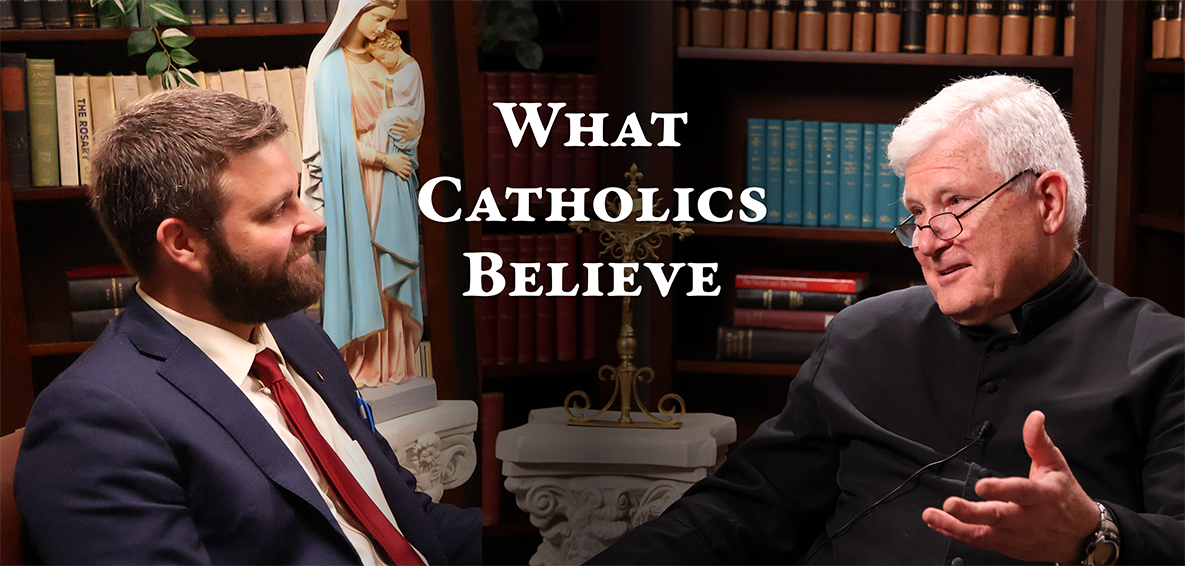Some Reflections on the Rosary

The prayer we call the “Hail Mary” is actually a compilation of elements (statements) in the New Testament. It begins with the words of the Angel Gabriel addressed to the Virgin Mary at the Annunciation: “Hail, full of grace, the Lord is with thee!” Thus, the opening words of the prayer corresponds to the very first mystery of the Rosary itself: The First Joyful Mystery.
The next part of the Hail Mary comes from the statement of St. Elizabeth at the Visitation: “Blessed art thou amongst women, and blessed is the fruit of thy womb!” Thus, the second part of the Hail Mary corresponds to the Second Joyful Mystery, the Visitation.
The Third Joyful Mystery of the Rosary commemorates the Nativity of Our Lord, and His receiving of the Holy Name — Jesus. And so this mystery provides the single-word completion of the first part of the Hail Mary with the Name: “Jesus.”
The rest of the Hail Mary has been added by the Church as an invocation beseeching Our Lady’s prayers “for us sinners.” But one might suppose that even that conclusion of the prayer stems from the Fourth Joyful Mystery. At the Presentation, Simeon prophesied to Mary that her Child “was destined for the rise and the fall of many in Israel,” and that He would be a “sign that would be contradicted.” He then told her that her “own soul a sword would pierce that the thoughts of many hearts might be revealed.” This prophesy looks ahead in time to the moment when the Blessed Mother stands at the foot of the Cross, united with her Son as He dies pleading for the forgiveness of sinners.” It was then that the soldier acknowledged: “Truly this was the Son of God!” And so, mindful of this prophecy of Simeon at the Presentation, we add: “Holy Mary, Mother of God, pray for us sinners now and at the hour of our death. Amen.” Thus, the beginning mysteries of the Rosary — the Joyful Mysteries — present to us in turn the very events which have formed for us the prayer we call the Hail Mary.
The recitation of the words of the Our Father, the Hail Mary, and the Glory Be are only the outward aspect of praying the Rosary. Prayer requires the inward acts of devoting our attention and our affection to God, or, as Saint Augustine speaks of prayer as raising one’s heart and mind to God. There can be no real prayer without the mind and the heart, the attention and affection, involved. When we pray the mysteries of the Rosary we lovingly ponder the very events which filled the mind and the heart of the Blessed Mother when, as the Gospel tells us, “Mary pondered all these things in her heart.” And so when we pray the Rosary, we fill our own minds and hearts with the thoughts of her mind and the affections of her heart. It is no wonder, therefore, that the Rosary is a prayer most beautiful and most pleasing to Mary. It enables us her children to place our hearts in union with her own Immaculate Heart, to think her thoughts and to love what she loves. The Rosary unites our own hearts to hers by filling our minds with her thoughts and our hearts with her love. In this way, the Rosary also unites our hearts to the Sacred Heart of Jesus, Whose Own Heart delights in the Immaculate Heart of Mary. The Rosary also allows us to share in the great power of Mary’s prayers, which have at their “command” (as it were) the power of Almighty God to heal and to save those who love God, and to resist the malicious designs of those who do not love God. In the life of the Blessed Virgin, we see that prayer determines the course of one’s life, but also the course of the world’s history.
In particular, the third of each of the sets of mysteries — the Joyful, the Sorrowful, and the Glorious — involves a crown. The 3rd Joyful Mystery speaks of the three kings, lowering their crowns before the Christchild. The 3rd Sorrowful recounts the crowning of Christ with thorns. The 3rd Glorious tells of the crowning of the Apostles with the Fire of the Holy Ghost on Pentecost. Thus, the royal Magi removed their crowns in homage to Him, we by our sins crown Him with thorns, and He by grace crowns us with fire. We give Him thorns; He gives us thrones.

